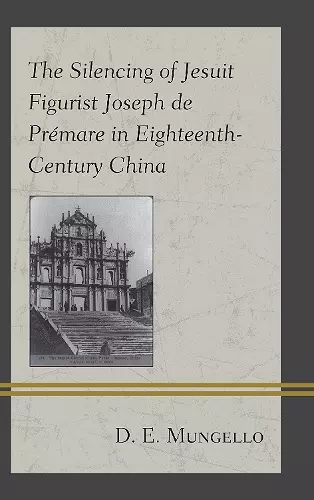The Silencing of Jesuit Figurist Joseph de Prémare in Eighteenth-Century China
Format:Paperback
Publisher:Lexington Books
Published:12th Apr '23
Currently unavailable, and unfortunately no date known when it will be back
This paperback is available in another edition too:
- Hardback£80.00(9781498595643)

The image of a voice in the wilderness evokes an outcast who has been condemned and banished by society. That image fits the scholar-priest Joseph de Prémare who spent the last thirty-eight years of his life (1698-1736) mainly in remote areas of China. He was condemned to silence by not only his religious superiors, but also by intellectuals in Europe. He was silenced because his Figurist theories were regarded as dangerous and implausible. And yet the irony of this silencing is that Father Prémare was one of the most knowledgeable Sinologists of all time. As a missionary in towns in the southern province of Jiangxi, he was freed from many pastoral duties by an assisting catechist and able to devote himself to intensive study of Chinese texts. He was practically a scholar-hermit who left the urban, politicized atmosphere of Beijing after only two years to return to Jiangxi province. There he cultivated Chinese literati who helped him assemble a remarkable collection of classical texts. He was prolific in producing a wide body of works in philology, history, philosophy, religion and drama.
Faced by critics who were claiming that Chinese culture was alien to Christianity, Prémare joined the effort led by his fellow Jesuit Joachim Bouvet to save the Christian mission in China from destruction. The Figurists were radical in arguing that the ancient Chinese texts, like the Old Testament, anticipated the coming of Christ long before his birth. They claimed that Chinese commentators erred in viewing these ancient texts as records of history when in fact they were works of metaphorical and figurative meaning. Influenced by a Chinese scholar, Prémare made a philological analysis of Chinese characters to explain his theory. When Figurism was condemned by his religious superiors, Prémare attempted to circumvent their prohibition by sending his manuscripts to the proto-Sinologist Etienne Fourmont in Paris, asking that they be published anonymously. Fourmont criticized Prémare’s theories and failed to publish them. By the time of his death, Prémare had sent most of his manuscripts to Paris where they remained buried for many years.
David Mungello’s work, while drawing on important publications by pioneers such as Knud Lundbæk, does at last give us a convenient synopsis of the career of a man whose breadth of reading in Chinese was probably over a century ahead of anyone else in the West. For that alone he surely does deserve to be remembered, and for ensuring that David Mungello certainly deserves our thanks.
* Bulletin of the School of Oriental and African Studies *Through these five chapters Mungello gives an intimate, almost encyclopedic overview of the fate of Prémare and of Figurism. He paints a picture of a fervent missionary and scholar. This work is concise and gives an excellent overview of the history of Figurism along the red thread of Prémare’s life and work in China and its ultimate failure to “save” the China mission. . . Mungello also makes a beautiful statement on academic freedom, even though, or maybe because, Prémare’s thoughts were radical and possibly heretical: no one deserves to be silenced.
* International Review Of Mission *M. performs a great service not only to sinologists but also to a broader readership, especially Catholics, by retrieving this little-known chapter of Catholic missions in China. In hindsight, the silencing of Prémare was a terrible injustice to this scholarly and saintly Jesuit, whose sole goal in elaborating Figurisme was to facilitate the con- version of the Chinese to Christianity by showing that God was already present at the beginning of their history and has revealed himself to their ancestors. May Prémare’s story provide a cautionary tale to contemporary church leaders, especially in Asia, not to fail to discern God’s hidden presence among their people, and not to silence those who try to point to it.
* Theological Studies *Mungello’s erudition and fine prose make this investigation of a most remarkable chapter of the history of the Christian mission in East Asia an inspiring and much-recommended read.
* Religious Studies Review *This book is a major contribution to a fascinating aspect of the Jesuit mission in China. Prémare's is a tragic story, and it is well told here, with compelling examples of his 'discovery' in the Chinese classics of prefigurations of Christian Revelation. However ultimately misguided his claims may have been, the author establishes beyond any possible doubt Prémare's encyclopedic knowledge of Chinese language and culture, and his devoted sincerity of purpose. -- Jonathan Chaves, professor of Chinese, The George Washington University
Never before has interest in the Jesuit enterprise in China been been more acute, and D. E. Mungello's study of the Jesuit Figurist, Joseph de Prémare, is among the most insightful and informed studies now available. This remarkable work on one of the progenitors of modern Sinology will receive wide acclaim. -- Anthony E. Clark, Whitworth University
...[G]iven that David Mungello has spent more than four decades engaged in the study of Prémare and the environment in which he operated, there is clearly no one better placed today to take up the cudgels on his behalf.... David Mungello’s work, while drawing on important publications by pioneers such as Knud Lundbæk, does at last give us a convenient synopsis of the career of a man whose breadth of reading in Chinese was probably over a century ahead of anyone else in the West. For that alone he surely does deserve to be remembered, and for ensuring that David Mungello certainly deserves our thanks.
* Bulletin of the School of Oriental and African StudiISBN: 9781498595667
Dimensions: 229mm x 151mm x 10mm
Weight: 254g
154 pages